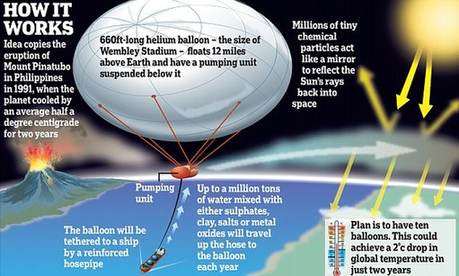來自英國牛津、劍橋、布里斯托以及愛丁堡等四所大學(xué)的科學(xué)家目前正在進(jìn)行一項改變氣候工程,計劃將一個巨型氦氣球投放在空中,通過軟管向其輸送化學(xué)粒子,希望這些粒子可以將太陽光反射回太空從而達(dá)到為地球降溫的效果。據(jù)介紹,這項工程的原理與火山噴發(fā)后,火山灰上升入大氣層形成制冷效果類似。科學(xué)家們表示,如果將十個這樣的氣球投放在空中,每年向它們輸送1000萬噸化學(xué)粒子的話,那么兩年內(nèi)全球氣溫就有可能下降2攝氏度。下個月,科學(xué)家們將率先將一個62英尺(約19米)的氣球投放在距離地面0.5英里(約805米)的空中,然后向其輸送小水滴,以檢測該項技術(shù)是否可行。如果該工程獲得批準(zhǔn),科學(xué)家們將會制作一個溫布利球場那么大的氣球,將其投放在海面上空。

 |
|
Floating 12 miles above our heads, this Wembley Stadium-sized helium balloon tethered to a ship may one day help save the planet from global warming. |
Floating 12 miles above our heads, this Wembley Stadium-sized helium balloon tethered to a ship may one day help save the planet from global warming.
British scientists are investigating whether an ordinary hosepipe can be used to shoot particles into the atmosphere – like an erupting volcano – and cool down Earth.
A prototype balloon has been built and will be hoisted into the air next month from a disused airfield in Norfolk in a £200,000 experiment.
The idea is that millions of tiny chemical particles will act as a mirror and reflect the Sun’s rays to stop the planet heating up.
Produced by scientists at Oxford, Cambridge, Bristol and Edinburgh Universities, the 660ft-long balloons would be positioned far out to sea if the plan is approved.
They say just ten balloons – pouring ten million tons of material into the stratosphere every year – could achieve a 2c drop in global temperature in two years.
Next month’s test will use a smaller, 62ft balloon, suspended about half a mile above the ground and using a hose to pump out harmless water droplets to see if the technology works.
Details of the £1.6million three-year project, funded by a Government grant, were presented at the British Science Festival at the University of Bradford.
Dr Matt Watson of Bristol University, who is leading the Stratospheric Particle Injection for Climate Engineering project, said: ‘We are doing a feasibility study only to see if it will work, we are not advocating it as a good idea.’
Volcanoes, which pump clouds of sulphate droplets into the sky when they erupt, have been shown to cool the climate.
Environmental groups warn geo-engineering may prevent global efforts to reduce carbon emissions and may affect the ozone layer and rainfall.
相關(guān)閱讀
(Agencies)

(中國日報網(wǎng)英語點津 Helen )
